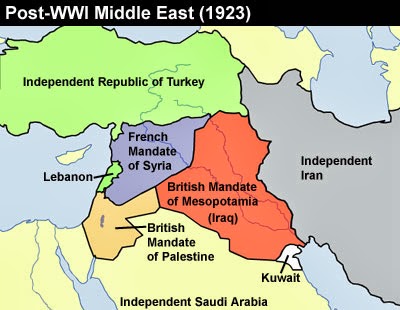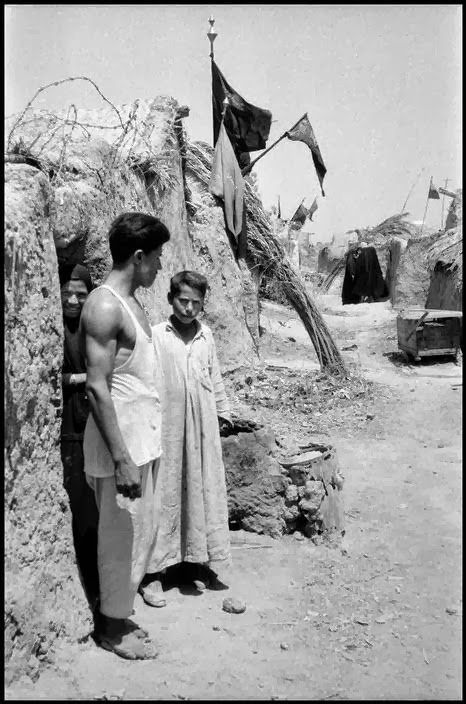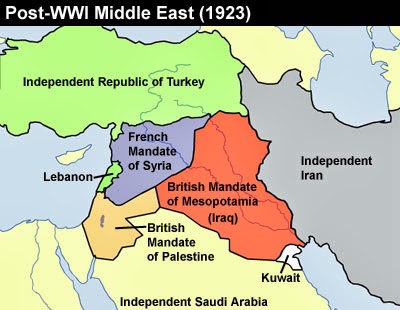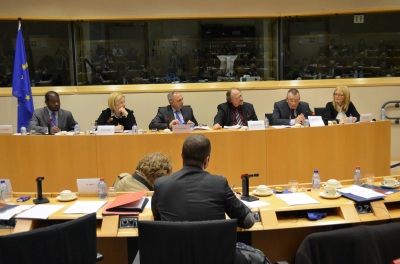MEP Metin Kazak: The EU should pay special attention to the deteriorating human rights situation of the Turkmens in Iraq
February 28, 2014 at 2:07 am | Posted in Turkmens | Leave a commentTags: Metin Kazak
MEP Metin Kazak: The EU should pay special attention to the deteriorating human rights situation of the Turkmens in Iraq
Un grand merci à Monsieur Metin Kazak, le député qui a le plus oeuvré au sein du
parlement européen pour faire connaître la cause des Turkmènes irakiens.
La Représentation du Front Turkmène irakien auprès de l’Union européenne
A Critical Look At Iraqi Nationalism and Sectarianism, An Interview With Author Harith Hasan
February 24, 2014 at 3:14 pm | Posted in Turkmens | Leave a commentTags: Harith Hassan, Iraqi nationalism, Sectarianism in Iraq
A Critical Look At Iraqi Nationalism and Sectarianism, An Interview With Author Harith Hasan
| World War I led to the creation of new countries like Iraq in the Middle East by the European Powers (World-ology) |
| Modernization and capitalism led to a huge migration from the countryside to the cities where many lived in make shift houses like these seen in Baghdad in the 1950s (Magnum Pictures) |
HIGH-LEVEL BRUSSELS CONFERENCE EXPOSES HUMAN RIGHTS ABUSE IN IRAQ
February 21, 2014 at 1:40 am | Posted in Turkmens | Leave a commentTags: CONF EU PARL HUMAN RIGHTS ABUSE IN IRAQ
19th February 2014
HIGH-LEVEL BRUSSELS CONFERENCE EXPOSES HUMAN RIGHTS ABUSE IN IRAQ
A high-level conference involving some of the most prominent political and religious leaders in Iraq, was held in the European Parliament, Brussels, on Wednesday 19th February. Organised and chaired by Struan Stevenson, MEP, President of the European Parliament’s Delegation for Relations with Iraq, the conference focused on human rights in Iraq and featured speeches from Sheik Dr Rafe Al Refaei – Grand Mufti of Iraq, Saleem Abdullah Al-Jabori – Chair of the HR Committee in the Council of Representatives, Haidar Mulla – Member of the Iraqi Council of Representatives, Minister Falah Mustafa Bakir – KRG Head of Department of Foreign Relations, Yonadam Kanna – Chair of the Labour and Social Affairs Committee in the Iraqi Council of Representatives, Kamel Zozo – Syriac Assyrian Chaldean Movement, Elisabetta Zamparutti – ‘Hands Off Cain’ NGO, Btrus Sliwa – Head of the KRG’s Independent Human Rights Board, Dr Abdul- Razzaq Rahim al- Shemmeri- Spokesman for the Herak Delegation from Al Anbar Governorate, Dr Sabah Al-Mukhtar – President of the Arab Lawyers Union, UK, Dr Mohammad Taha Hamdoon, Spokesman of the Popular Movement in Iraq, Dr Moneir Hashm Al-Aobyde, Spokesman for the Movement of Baghdad and many others. The eminent speakers were welcomed by Dr. Charles Tannock MEP, Foreign Affairs Spokesman for the ECR Group.
Many Iraqi guests had travelled to Brussels to participate in the conference, which follows the publication of a highly critical report on Iraq by the European Parliament’s Directorate-General for External Policies – entitled “Iraq’s deadly spiral towards a civil war”. A resolution condemning the on-going violence and abuse of human rights in Iraq is also under preparation in the European Parliament and will be debated in Strasbourg next Wednesday, 26th February. The draft resolution refers repeatedly to the damning report on the abuse of women in Iraq published recently by Human Rights Watch.
Speaking after the Conference, Struan Stevenson MEP said:
“Last November, I was in Iraq. I met with many leading politicians, religious leaders and with courageous men and women who had led popular uprisings and protests in Al Anbar and 6 provinces of Iraq and in many Iraqi cities. The message from all of them was identical. They told me that lawlessness, terrorism, corruption and the systematic abuse of human rights are each a daily feature of life in Iraq. They told me that Prime Minister Nouri al-Maliki is rapidly becoming another Saddam Hussein and that modern Iraq is a dust bowl of violence and bloodshed. More than 9,500 people died last year in bomb attacks and assassinations in an increasingly ugly insurgency that threatens to take the country back to the civil war that erupted from 2006-2008. Over 1000 have died already this year.
“It was these same people, people from different ethnic backgrounds, from different faiths and creeds, but who share a desire to see freedom, democracy, justice and peace restored to their country, who urged me to organise today’s conference, so that they could come to the European Parliament and reveal the truth about Iraq to the West. I am deeply grateful to them and thank them for the expense, effort and courage they have expended to come here today.
“They told us in graphic detail how Maliki is using the Iraqi military in a genocidal campaign of ethnic cleansing against the Sunni population of Ramadi and Fallujah, aided and abetted by a generous supply of missiles, rockets, drones and other weaponry from the US, which he uses to slaughter his own people, on the pretext that they are terrorists. The US has even decided to sell and rent Maliki Apache helicopters which he will use to massacre men, women and children in Al Anbar. It is an outrage.
“I am also appalled at the treatment of the 3000 refugees in Camp Liberty who are incarcerated in prison-like conditions and where the Iraqis are even restricting supplies of food and preventing emptying of sewage tanks, causing the camp to flood with polluted sewerage water and risking health. These defenceless people have been repeatedly attacked by Maliki’s forces, including the horrific massacre of 52 of their colleagues in Camp Ashraf last September, when 7 hostages were seized, 6 of whom are women and nothing has been heard from them since. The limp-wristed response from the west has simply encouraged further atrocities of this kind.
“It is time the West woke up to the tragedy of Iraq. It was the US and the UK – George W. Bush and Tony Blair – who invaded Iraq and overthrew Saddam, declaring: “Mission accomplished”. They boasted that they had left behind “a functioning democracy”, when in fact they left behind a basket case. It was the US who colluded with Iran to return Maliki to power after the last election, even although he had lost that election by 2 seats. Now, in breach of the Erbil Agreement, Maliki has retained control over the Defence, Intelligence and Interior Ministries in his own office and he has even created new, independent security 6 intelligence organisation that is answerable only to him, giving him despotic powers.
“There is still time for the West to reassert its authority and make amends for its disastrous intervention in Iraq. The UN, US and EU must tell Maliki that his whirlwind of bloodshed, violence, corruption and abuse will no longer be tolerated. Unless there are free and fair elections on 30th April that can restore a semblance of democracy to Iraq and provide the beleaguered people of that country with a non-sectarian, secular government, committed to the restoration of the rule of law and respect for human rights, then the economic umbilical cord to the West must be severed.”
In his address to the conference Dr Rafe Al Refaei – the Grand Mufti of Iraq, said: “Maliki is following a heinous policy of indiscriminate bombings of innocent people. The people of Al-Anbar did not start the war. We did everything to reach a peaceful settlement. Maliki forces attacked the peaceful rallies. They have bombarded the houses of innocent people. My own brother was killed last week in the bombardment and was not from al Qaeda or from Daesh. When Maliki launched his so-called war against terrorists in the desert in Anbar province not a single combatant of al Qaeda was killed. The only people killed were innocent shepherds. What is happening in Fallujah is genocide. 1000 civilians have been injured. Events in Iraq have taken a very dangerous turn. It could lead to a civil war in which all Iraqi people will lose. The European Parliament should deal with this matter. We’ve been handed on a golden platter to the Iranian govt.”
Saleem Abdullah Al-Jabori – Chair of the HR Committee in the Council of Representatives said: “We called on the international community to come to our rescue, but we were faced with just talk and no action. Now Iraqi women’s tears have dried up. We’re sick of unfulfilled promises. But all of this has not put an end to bloodshed in Iraq. All of the violations are serious, all are important. They are issues of international governance and international law. We Iraqis are the ones who suffer. Investigators use torture to obtain confessions. We need to adopt legislation that will put a stop to violations of prisoners. A person can be detained for years on false accusations. But HR violations will not lead to the eradication of terrorism. Our committee has managed to get many women released from prison. Iraq is rich in diversity, but the killing still goes on. There are around 10 car bombs every day. The Iraqi media should be given more freedom to report the truth. Tens of thousands of civilians have been displaced in al Anbar Province. A generation has lost all of its rights.”
Haidar Mulla – Member of the Iraqi Council of Representatives said: “Mr Stevenson has increased the influence of the EU in Iraq and in particular, he has increased the importance of HR. We had hoped that Iraq would become a democracy after the fall of the previous regime. But our HR record is not something we should be proud of. Our task is difficult and complex. We have to pave the way for a culture that respects HR. Until now GoI did not implement article 19 on HR. This is not a gift to the people. It is their right. Currently there is a ratio of one military personnel to 27 civilians and even so we cannot live peacefully. We have a political crisis and we have to deal with it politically.”
Btrus Sliwa – Head of the Independent KRG Human Rights Board said: “The Ministry of HR was abolished in 2009 because it was being politically influenced. The government set up an independent board not linked to any political body. There is a high rate of domestic violence against women in parts of Kurdistan which we have legislated to stop. There are also now an estimated 200,000 IDPs in Kurdistan as well as over 200,000 refugees from Syria.”
Dr Abdul-Razzaq Rahim Al Shemmeri – speaker for the Herak Delegation from the al-Anbar Governorate said: “This is my first time in the EU and I have come to bring the true voice of Anbar to the European Parliament. Why do you turn a blind eye to the Shia militias who slaughter our people? The Sunni movement entered the conflict through the demonstrations and sit-ins which started in 2012. But it was clear from the start that there was no political will to deal with the demonstrators in a peaceful way. Maliki’s army invaded the places where the demonstrators were gathering. The crimes being committed there are similar to Bosnia, Herzegovina. Anti-terrorist forces were sent by the GoI in 2013 to arrest leaders of the so-called terrorist movement in Anbar under the pretext of fighting terrorism. Maliki resorted to threatening us, stating it was a rebellion under influence of foreign forces. He told his forces to finish us off before we finished him off!”
Dr Sabah al-Mukhtar – UN Permanent Representative, Arab lawyers Union, said: “Sending foreign troops to spread democracy turns the concept upside down. HR abuses occur in every country, but Iraq has a unique situation. Maliki abuses all of the human rights of all of the people, all of the time. Iraq is also bottom of the transparency international list of corrupt states, behind even Somalia and Sudan. Why did the Americans liberate Iraq and then hand it over to the mullahs in Iran?
Minister Falah Mustafa Bakir – KRG Head of Department of Foreign Relations, said: “HR is not a privilege. It is a basic right. We care about HR because as Kurds we have a long experience of suffering. Our democracy is in its infancy. No-one can claim they are perfect. Respect for HR is what we care about in Kurdistan. We have a culture of tolerance and peaceful coexistence. This has led to prosperity for the people and an economic boom. Diversity is the source of our strength. We have also provided shelter for IDPs and refugees. The KRG also focused on women and children to address issues that empower and protect them. Women must be part of society and properly protected in all walks of life. Unlike the federal government in Baghdad, we have always welcomed UN HR reports. As Kurds we will not accept the status of 2nd class citizens. We’d like to see all of Iraq become like Kurdistan.”
Kamel Zozo, representing the Syriac Assyrian Chaldean Movement said: “Iraq is a country for all of us. As Christians we’ve been there since the creation of Iraq. Now we are filled with bitterness and sadness when we see what has happened to the ethnic minorities. The system of government in Iraq is now a despotic one. Christians are doomed to extinction. This is the land of our fathers and forefathers and yet we are being driven from it. We must enact necessary laws to give us protection. Plans to change the demography of Nineveh and other regions are directly targeting the Christian community. We are being pushed into an unknown future. Can I request that EP pays attention to the minorities in Iraq.”
Elisabetta Zamparutti – Italian politician in the Radical Movement and Treasurer of “Hands off Cain” NGO, said: “Executions began again after a suspension in August 2005. Over 600 people have been executed since then, 117 last year alone. Iraq is now 3rd behind China and Iran for the number of executions it carries out. There are wooden gallows working overtime in the old intelligence HQ building in Baghdad, where Saddam was hanged. No records of these executions are kept. The justice system in Iraq is broken. Those executed are not represented properly. Evidence taken from secret informants cannot be challenged in court. We need to reflect on the situation in Iraq today.”
A Critical Look At Iraqi Nationalism and Sectarianism, An Interview With Author Harith Hasan
February 18, 2014 at 4:36 pm | Posted in Turkmens | Leave a commentTags: Iraqi nationalism, iraqi sectarianism
A Critical Look At Iraqi Nationalism and Sectarianism, An Interview With Author Harith Hasan
| World War I led to the creation of new countries like Iraq in the Middle East by the European Powers (World-ology) |
More hardship, displacement as fighting continues in Iraq’s Anbar province – UN
February 16, 2014 at 10:06 am | Posted in Turkmens | Leave a commentTags: Displaced Iraqis
United Nations News Centre
More hardship, displacement as fighting continues in Iraq’s Anbar province – UN
UNHCR spokesperson Melissa Fleming.
11 February 2014 – The United Nations said today that it is receiving more reports of civilian casualties and further displacement within Iraq as the conflict in Anbar province continues.
Over the last six weeks up to 300,000 Iraqis – some 50,000 families – have been displaced due to insecurity around Fallujah and Ramadi in the province, the UN High Commissioner for Refugees (UNHCR) reported.
The Iraqi Government estimates that it will initially need $35 million to address humanitarian needs caused by the Anbar crisis, which began at the end of 2013, including providing food, bedding and other supplies.
UNHCR field staff report that displaced Iraqis are residing in schools, mosques and other public buildings and urgently need various humanitarian items. Pregnant women and children need medical care while all families are in need of drinking water, milk and other food aid, diapers, beds and cooking items.
“Most of the displaced have fled to outlying communities in Anbar province to escape the fighting while 60,000 persons have fled to more distant provinces,” UNHCR spokesperson Melissa Flemingtold reporters in Geneva.
In a relief operation coordinated by the UN Assistance Mission in Iraq (UNAMI) to support the Government’s response, UNHCR has distributed more than 2,300 kits of core relief items and 175 tents in various locations across the country.
The UN Children’s Fund (UNICEF) has so far distributed more than 1,250 hygiene kits and various water/sanitation supplies and plans to send more in the coming days, while UN’s partner aid organizations are also providing critically needed relief items.
“Access and roadblocks remain a challenge,” Ms. Fleming said, noting that a consignment of World Health Organization (WHO) medical supplies has reportedly been detained at an Iraqi Army checkpoint since 30 January. “Many bridges leading into the Anbar region have been destroyed and roads are blocked, complicating deliveries to communities hosting IDPs [internally displaced persons],” she said.
UNHCR added that the 300,000 new IDPs are on top of Iraq’s population of more than 1.1 million displaced persons, who have still not returned to communities wracked by violence mainly during the 2006-2008 upheaval.
http://www.un.org/apps/news/story.asp?NewsID=47117&Cr=iraq&Cr1=#.UvxRX_ldVNu
ITF EU representative attended the Conference “The State of Freedom of Religion or Belief in the World” at the EU Parliament
February 15, 2014 at 2:14 am | Posted in Turkmens | Leave a commentITF EU representative attended the Conference “The State of Freedom of Religion or Belief in the World” at the EU Parliament
The conference welcomed the adoption of EU Guidelines on the promotion and protection of freedom of religion or belief, by the EU Member States last year. Participants agreed that this was a major step, however, the process of ensuring a thorough implementation has only just begun. Also, complementing measures were needed.
MEP Peter van Dalen said:
“Today is a sad day as right now many millions of people are bullied, discriminated, persecuted and even killed for their faith. I hope that our work may contribute towards improving this situation.”
“We made several recommendations on specific countries. On Egypt for example, we would like the EU to unfreeze the aid pledged, but tie it to human rights conditions; Coptic Christians must be able to freely and safely practise their faith. On Pakistan, we demand that hate speech be scrapped from school books, in particular where they are subsidized by the EU! On India, we’d like to see the states who have introduced anti-conversion legislation, to repeal those provisions.”
MEP Dennis de Jong said:
“I am grateful for the co-operation we developed with the EEAS on the EU Guidelines. However, we now need to follow this up through an informal dialogue on the toolkit which will serve as an instrument for embassies and EU delegations to implement the Guidelines.”
“Similarly, we need to further develop our dialogue with the EEAS also on the countries of concern: we identified many such countries and we now have to focus on the instruments the EU and the Member States have to help to change the situation in these countries.”
Dr. Heiner Bielefeldt said:
“I see an enormous practical potential in the EU Guidelines, in harnessing the existing capacities of the EU and its Member States to make Freedom of Religion or Belief a reality. I value the Working Group’s strategic role in promoting the Guidelines and their efficient implementation. The European Parliament would be well advised to upgrade the working group to an intergroup.”
Recommendations for Iraq:
Iraqis demonstrate in front of the EU Parliament to denounce terrorism, sectarianism and corruption
February 15, 2014 at 2:06 am | Posted in Turkmens | Leave a commentTags: Iraqis demonstrate in Brussels
Iraqis from Belgium and the Netherlands demonstrate in front of the EU Parliament to denounce terrorism, sectarianism and corruption in Iraq
U.S. Continues War by Proxy: Playing the Al-Qaeda Card to the Last Iraqi, by Nicola Nasser
February 13, 2014 at 5:02 pm | Posted in Turkmens | Leave a commentTags: Al Qaeda In Iraq, Displaced Iraqis, Iraqi deaths
Iraq is now “on the edge of the abyss,” director of Middle East Studies at the Royal United Services Institute (RUSI), professor Gareth Stansfield, wrote on this February 3. This situation is “being laid at the door of Prime Minister Nouri al-Maliki,” who “is now portrayed as a divisive figure,” he said.
In their report titled “Iraq in Crisis” and published by the Center for Strategic and International Studies (CSIS) on last January 24, Anthony H. Cordesman and Sam Khazai said that the “cause of Iraq’s current violence” is “its failed politics and system of governance,” adding that the Iraqi “election in 2010 divided the nation rather than create any form of stable democracy.”
On the background of the current status quo, Iraq’s next round of elections, scheduled for next April 30, is expected to fare worse. Writing in Al-Ahram Weekly last August 14, Salah Nasrawi said that more than 10 years after the U.S. invasion, “the much-trumpeted Iraqi democracy is a mirage.” He was vindicated by none other than the Iraqi Speaker of the parliament Osama Al Nujaifi who was quoted by the Gulf News on last January 25 as saying during his latest visit to U.S.: “What we have now is a facade of a democracy — superficial — but on the inside it’s total chaos.”
U.S. Continues War by Proxy: Playing the Al-Qaeda Card to the Last Iraqi
Global Research, February 12, 2014
Url of this article:
http://www.globalresearch.ca/u-s-continues-war-by-proxy-playing-the-al-qaeda-card-to-the-last-iraqi/5368500
International, regional and internal players vying for interests, wealth, power or influence are all beneficiaries of the “al-Qaeda threat” in Iraq and in spite of their deadly and bloody competitions they agree only on two denominators, namely that the presence of the U.S.-installed and Iran–supported sectarian government in Baghdad and its sectarian al-Qaeda antithesis are the necessary casus belli for their proxy wars, which are tearing apart the social fabric of the Iraqi society, disintegrating the national unity of Iraq and bleeding its population to the last Iraqi.
The Iraqi people seem a passive player, paying in their blood for all this Machiavellian dirty politics. The war which the U.S. unleashed by its invasion of Iraq in 2003 undoubtedly continues and the bleeding of the Iraqi people continues as well.
According to the UN Assistance Mission to Iraq , 34452 Iraqis were killed since 2008 and more than ten thousand were killed in 2013 during which suicide bombings more than tripled according to the U.S. Deputy Assistant Secretary of State Brett McGurk’s recent testimony before the House Committee on Foreign Affairs. The AFP reported that more than one thousand Iraqis were killed in last January. The UN refugee agency UNHCR, citing Iraqi government figures, says that more than 140,000 Iraqis have already been displaced from Iraq ’s western province of Anbar .
Both the United States and Russia are now supplying Iraq with multi–billion arms sales to empower the sectarian government in Baghdad to defeat the sectarian “al-Qaeda threat.” They see a casus belli in al–Qaeda to regain a lost ground in Iraq, the first to rebalance its influence against Iran in a country where it had paid a heavy price in human souls and taxpayer money only for Iran to reap the exploits of its invasion of 2003 while the second could not close an opened Iraqi window of opportunity to re-enter the country as an exporter of arms who used to be the major supplier of weaponry to the Iraqi military before the U.S. invasion.
Regionally, Iraq’s ambassador to Iran Muhammad Majid al-Sheikh announced earlier this month that Baghdad has signed an agreement with Tehran “to purchase weapons and military equipment;” Iraqi Defense Minister Saadoun al-Dulaimi signed a memorandum of understanding to strengthen defense and security agreements with Iran last September.
Meanwhile Syria , which is totally preoccupied with fighting a three –year old wide spread terrorist insurgency within its borders, could not but coordinate defense with the Iraq military against the common enemy of the “al-Qaeda threat” in both countries.
Counterbalancing politically and militarily, Turkey and the GCC countries led by Qatar and Saudi Arabia, in their anti-Iran proxy wars in Iraq and Syria, are pouring billions of petrodollars to empower a sectarian counterbalance by money, arms and political support, which end up empowering al–Qaeda indirectly or its sectarian allies directly, thus perpetuating the war and fueling the sectarian strife in Iraq, as a part of an unabated effort to contain Iran’s expanding regional sphere of influence.
AL-AMIRIYA: Bombing a civilian shelter is a crime against humanity
February 13, 2014 at 2:02 am | Posted in Turkmens | Leave a commentTags: Al-Amiriya shelter
Abri d’Al- Amiriya
Photos taken during my first visit to the shelter on 1st March 1992
Photos prises lors de ma première visite de l’abri le 1er mars 1992
BOMBING A CIVILIAN SHELTER IS
A CRIME AGAINST HUMANITY
BOMBARDER UN ABRI CIVIL
EST UN CRIME CONTRE L’HUMANITE
During the night of 13-14 February 1991 the U.S. sent 2 laser guided missiles to destroy the Al-Amiriya shelter in Baghdad, killing hundreds of women and children (488) who had sought refuge there during the U.S. bombardments on Baghdad’s residential areas.
When I visited Al-Amiriya one year after the U.S. attack, all the houses around the shelter still had black banners with the names of relatives who had died inside the shelter during that terrible night.
Pendant la nuit du 13-14 février 1991, les Etats Unis ont envoyé 2 missiles sur l’abri civil d’Al- Amiriya à Bagdad, tuant des centaines de civils (488), la majorité d’entre eux étaient des femmes et des enfants qui y avaient cherché refuge pendant les bombardements américains incessants sur les quartiers résidentiels de Bagdad.
See VIDEO : 1991, USA Crime in Iraq جريمة أمريكية في العراق
http://www.youtube.com/watch?v=iaYkj0omcMA
Create a free website or blog at WordPress.com.
Entries and comments feeds.
















